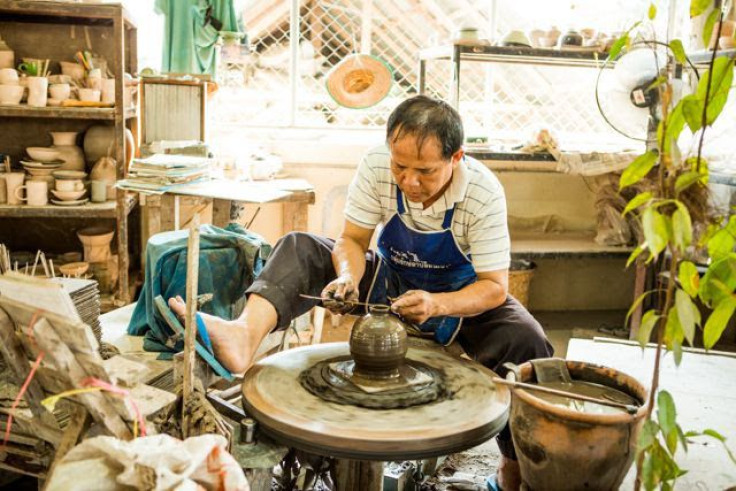First Annual World Artisan Day Launches April 18, 2021 Honoring Artisans For Uplifting Communities And Preserving Culture Around The World

The first annual World Artisan Day will launch on April 18, 2021 to honor artisans around the world for their unique contributions to uplifting communities and preserving humanity’s cultures and traditions. World Artisan Day will center around sharing the stories of individual artisans in remote corners of the world. The theme for this inaugural event is “a better world for artisans is a better world for all”.
Roberto Milk, CEO of NOVICA and a descendant of Peruvian artisans, noted that a remote festival, held high in the Andes, to celebrate Peruvian Artisan Day was the inspiration behind the creation of World Artisan Day, “We wanted to create a special day to recognize the unique role that artisans play in uplifting their communities and preserving global culture. When artisans are able to earn a living from their art, when they can support themselves and their families and eventually hire others, entire communities are transformed and uplifted and the world is an artistically richer, happier place.”
Novica, refers to artisans as living treasures, much as UNESCO characterizes certain art forms as part of the intangible cultural heritage of humanity. These global artisans connect us to a cultural history; one that respects time, traditional skills and creative expression. For World Artisan Day, NOVICA will share the stories of individual artisans because they believe that while each artisan’s story is unique unto itself, it also captures aspects of the artisan experience that transcends regional and cultural differences.
NOVICA will profile artisan stories from eight regions of the world including Indonesia, West Africa and the Andes. Some of these artisans are recognized masters who have received awards and international recognition. Others create in order to survive and feed or educate their children. All are important and all contribute to our global culture, traditions and happiness.
One story involves Buana, an artisan from Bali who became one of Novica’s most successful jewelry makers. In 2006 Buana was in a challenging situation unable to collect money from the tourist shops that consigned his jewelry and unable to provide for his wife and young son. That changed the day he met NOVICA, which enabled him to establish a direct fair trade relationship with customers on NOVICA’s impact marketplace, where he sets his own prices. This allowed Buana to remove layers of middlemen and make his designs available for customers to purchase online. Today he is one of Novica’s best-selling jewelry artisans and able to support his growing family. He has built a house with an attached workshop and employs eighteen local silversmiths to help fill his global orders. Buana's designs are influenced by Balinese traditions and the beauty and tranquility of this island paradise.
Another artisan, West African wood carver Ernestina Oppong Asante, speaks to the resilience and versatility that artisans embody. A trained dressmaker unable to earn a living in her community, she determined to learn to carve — a craft generally reserved for men. She not only infiltrated this male-dominated world, she made an impact and eventually built her own workshop. Ernestina now employs other carvers in her village, including her husband Daniel Asante, who is a NOVICA artisan in his own right. Together they have educated their children and helped their neighbors. Recently Ernestina has returned to her textile roots and has begun to create intricate African threadwork pieces featuring Adinkra and Sankofa symbols drawn from the Akan people of West Africa.
From the Andes comes the story of Alfredo Falcon, a textile artisan who learned to knit from his parents, who in turn learned from their parents. Alfredo’s family survived on the meager income they earned selling sweaters to tourist shops in Huarez, Peru. When the city was devastated by an earthquake and the attendant terrorist attacks, the family fled to a settlement near Lima. Eventually Alfredo set up a small workshop and began to grow his textile business. He had moderate success but his life changed when he met renowned Peruvian artisan Leoncio Tinoco, who suggested that he join him in working with NOVICA. Alfredo’s sales increased significantly. He was able to invest in new equipment for his workshop and to expand his product range from small accessories such as hats and scarves to fashion-conscious sweaters, capes and ponchos. Today he not only supports his own employees but he also supports a large group of women from the soup kitchens, a Peruvian social program that feeds the poor in his surrounding neighborhood. These women add the hand-finished details such as crochet trim to his workshop’s products. He has transformed the lives of hundreds of these women by providing work that can be done from home while they care for and school their children.
These stories of transformation —of the journey from subsistence to happiness — reveal the empowerment that stems from an artisan being in business for themselves and setting their own prices. A direct connection to global customers brings about success and well-deserved recognition. Those customers know that shopping with purpose has a multiplier effect — communities are uplifted and cultural traditions are preserved. In that sense, World Artisan Day also celebrates all those who shop with a purpose — all those who recognize an inherent truth: when artisans succeed, we all succeed because a better world for artisans is a better world for all











